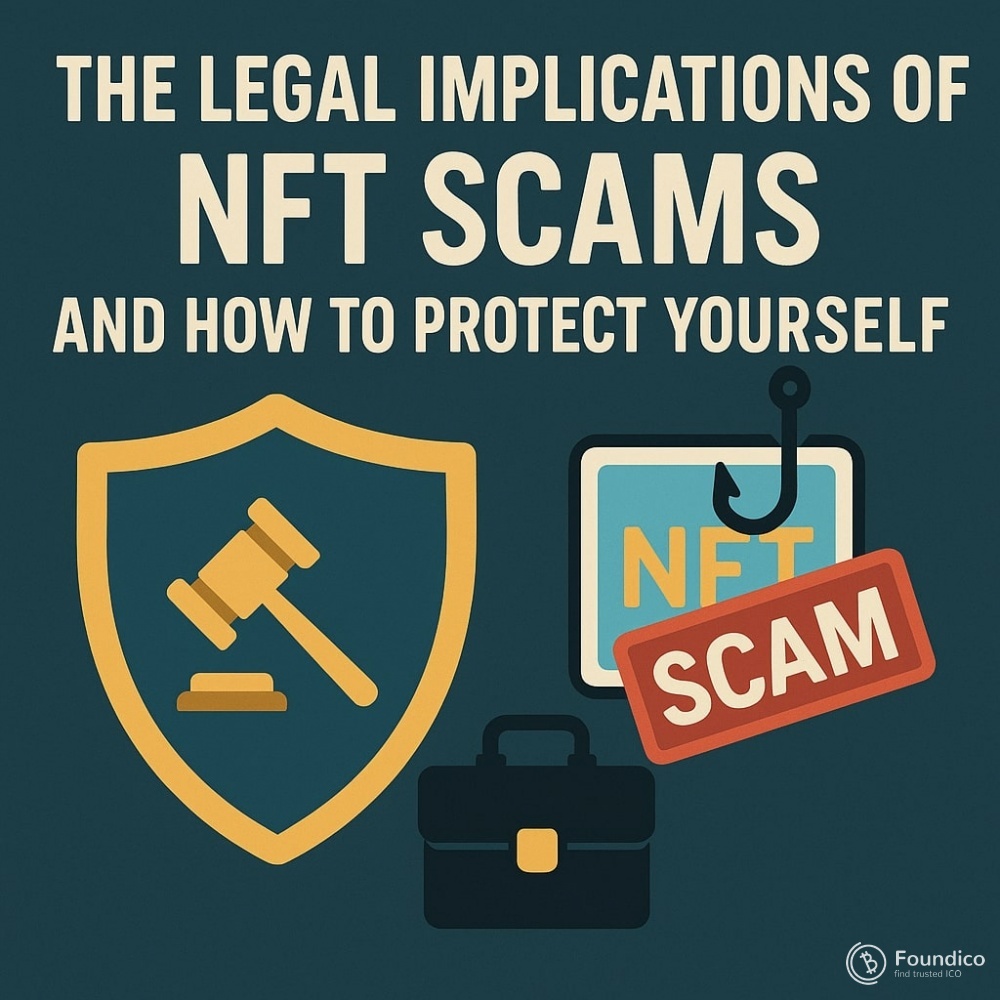The Legal Implications of NFT Scams and How to Protect Yourself

By Dr. Pooyan Ghamari, Swiss Economist and Visionary
The explosive rise of Non-Fungible Tokens (NFTs) has transformed the digital economy, offering unique opportunities for creators, collectors, and investors worldwide. However, this rapid growth has also attracted fraudsters exploiting legal loopholes and regulatory uncertainties, leading to a surge in NFT scams. Understanding the legal implications of NFT scams—and knowing how to protect yourself—is vital in today’s digital marketplace.
As a Swiss economist and visionary focused on digital economies, I have closely observed both the promise and pitfalls of NFTs. This article will explore the legal landscape surrounding NFT scams, the risks involved, and practical strategies to safeguard your interests.
Understanding NFT Scams: A New Frontier of Fraud
NFT scams encompass a wide range of deceptive practices designed to mislead buyers or steal digital assets. Common NFT scams include:
-
Fake or Counterfeit NFTs: Fraudsters mint and sell NFTs that imitate original works by renowned creators.
-
Phishing Attacks: Scammers trick victims into revealing private keys or wallet passwords.
-
Pump and Dump Schemes: Manipulating NFT prices artificially, then dumping tokens for profit while leaving others with worthless assets.
-
Rug Pulls: Developers create an NFT project to raise funds, then abandon it, leaving investors with no value.
-
Impersonation and Fake Marketplaces: Fraudsters create fake profiles or sites that look like legitimate NFT marketplaces.
These scams have led to significant financial losses and complicated legal challenges for victims.
Legal Challenges in NFT Scam Cases
The decentralized, cross-border nature of NFTs creates unique legal complications:
1. Jurisdictional Ambiguities
NFT transactions occur on blockchains that transcend national borders, making it difficult to determine which country’s laws apply. This complicates enforcement actions and legal recourse for victims.
2. Lack of Clear Regulation
Many jurisdictions are still developing legal frameworks for NFTs, leaving gaps in consumer protection and enforcement. This regulatory vacuum can embolden scammers.
3. Ownership and Intellectual Property Rights
Legal disputes often arise regarding who owns the rights to the digital content linked to an NFT. Buyers may mistakenly believe they own copyright or reproduction rights when, in reality, only token ownership is transferred.
4. Anonymity of Perpetrators
Blockchain’s pseudo-anonymity makes it challenging to identify scammers, trace stolen assets, or hold bad actors accountable.
Legal Protections and Remedies Available
Despite these challenges, several legal tools can protect NFT buyers:
-
Contract Law: Purchase agreements and terms of service from marketplaces may provide legal grounds for claims if breached.
-
Consumer Protection Laws: Some countries apply existing consumer protection statutes to digital goods, offering remedies against fraud.
-
Intellectual Property Laws: Artists and buyers can pursue copyright infringement claims if NFTs are minted without authorization.
-
Anti-Money Laundering (AML) and Know Your Customer (KYC) Regulations: Increasingly, NFT platforms are implementing AML/KYC measures to reduce fraudulent activities.
-
Reporting to Authorities: Victims can report scams to law enforcement or financial regulatory bodies that are beginning to develop expertise in crypto-related crimes.
How to Protect Yourself Legally and Practically
1. Conduct Thorough Due Diligence
Research the creator, verify authenticity, and confirm the legitimacy of marketplaces. Avoid deals that seem too good to be true.
2. Understand the Terms and Conditions
Carefully read the sale terms, ownership rights, and licensing agreements attached to NFTs. Know exactly what rights you are acquiring.
3. Use Reputable Marketplaces
Stick to platforms with strong verification processes, transparent policies, and dispute resolution mechanisms.
4. Secure Your Digital Wallet
Use hardware wallets, enable two-factor authentication, and never share your private keys or seed phrases.
5. Keep Detailed Records
Maintain records of transactions, communications, and contracts related to your NFT purchases. These can be crucial if legal action becomes necessary.
6. Consult Legal Experts
If you suspect fraud or plan a significant investment, seek advice from lawyers knowledgeable in blockchain and digital asset law.
The Future of NFT Regulation
As NFTs mature, regulatory bodies worldwide are beginning to develop frameworks addressing their unique challenges. International cooperation, clearer guidelines on digital ownership, and enhanced consumer protections will help reduce scams and increase trust in the NFT ecosystem.
NFT scams present complex legal and practical challenges, but understanding the risks and legal implications can empower buyers to protect themselves effectively. By exercising due diligence, using secure platforms, and staying informed about legal developments, you can confidently navigate the evolving world of NFTs while minimizing exposure to fraud.
About the Author
Dr. Pooyan Ghamari is a Swiss economist and visionary with deep expertise in blockchain technology and digital finance. He is dedicated to educating the public on the economic, legal, and technological aspects of emerging digital assets such as NFTs.

 BitcoinHyper - Bitcoin Hyper finally unlocks fast and cheap Bitcoin transactions by delivering the first ever Bitcoin Layer 2 blockchain.
BitcoinHyper - Bitcoin Hyper finally unlocks fast and cheap Bitcoin transactions by delivering the first ever Bitcoin Layer 2 blockchain.